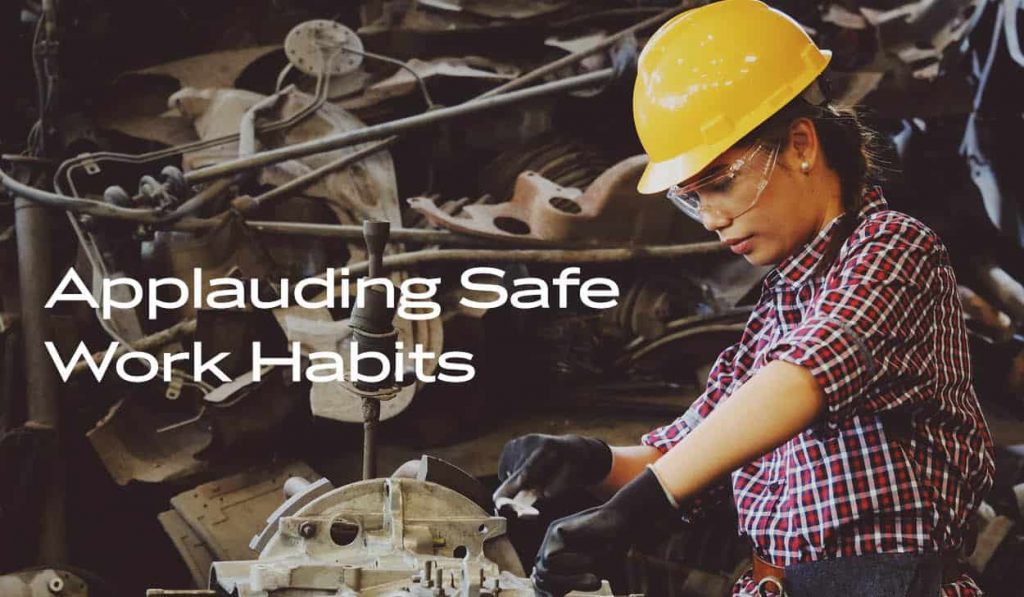July 29, 2019

With a job to get done quickly and the clock ticking, safety can be the last thing on a manager’s mind. However, risking a workplace injury or accident isn’t worth it. In addition to potentially damaging your equipment, workers can get hurt, sometimes sustaining a life-long injury. To say this is bad news for them and for you is an understatement of the tragedy.
Unfortunately, staff out of work means that work isn’t getting done and yet that unforgiving clock is still ticking. What is a manager to do?
Most workplace accidents can be avoided. Add an emphasis on safety in your company culture and watch the psychology of your employees change. A company culture includes its company values, what it stands for, its expectations and goals, and its work environment.
Workplace culture starts at the top. As the adage goes, “attitude reflects leadership.” If management doesn’t emphasize safety, employees will not have the attitude necessary to consistently implement safe work practices.
Below are some effective ways to encourage worker psychology to include an attitude of safety.
An attitude of safe work habits
Trade schools, unions, the Red Cross and industry associations have a wealth of information on safety tips specific to your industry. Some industries have risks pertaining to heavy lifting, others to dangerous chemicals or even hazards related to sitting too long.
For example, an often-missed potential danger is the inappropriate use of ladders. Workers can angle them unsafely or forgo having a spotter. If workers know that ladder safety is as important to management as quality and quantity of work, they will be less likely to make poor decisions regarding ladders.
This same principle is true for all potential dangers in industry, ranging from working with electrical equipment while standing on a wet floor to sitting too long at a job. Workers need to know safe work habits and that management cares they use them.
Safety apps can help
There are numerous safety apps out there that can help you keep workers safe. Implementing technology shows workers that you care about them and their safety. Showing that you care can increase employee retention while reducing workplace injuries.
Knowing that their employers care about them will increase loyalty to both employers and management. This psychological response will help them to more willingly comply with new procedures you may introduce along the way to keep them safe.
Safety apps can range from first aid apps that integrate with the Red Cross and emergency dispatch to angling ladders correctly to GPS tracking of employee location and alerts to management if there is an accident. However, in order for safety apps to work, they must be turned on and accurately used by employees. Employees need to be motivated to use company safety procedures. Employee recognition can help.
Employee Recognition
Recognizing employees pays in the long run. Harvard Business School Assistant Professor Ashley V. Whillans reported to Harvard Business Week that “Companies with strong recognition programs enjoy increased productivity, lower job turnover, and greater returns on investment than other companies in the same industries.”
Gifts over Cash
Whillans also says that recognition efforts using gifts can be more effective than bonuses. A study of 600 salespeople found that when a rewards system of cash and prizes was replaced with an all-cash incentive of equal value, employee motivation dropped. An unfortunate decrease in sales by 4.36 percent followed, costing the company millions in revenue.
The type of incentive given to employees can be a major factor in their compliance with safety procedures. Cash can be spent on basic necessities, such as rent or groceries, but a reward to a concert or a sporting event can give memories.
In addition, employees may feel embarrassed to talk about money, but are more willing to talk about thoughtful gifts and awards with their coworkers. Workplace buzz about safety will increase a focus on safety.
Advantages of Peer Recognition
Managers may not always see employees using safety strategies. Peers are more likely to notice them. A peer recognition program will not only increase a desire for safety but will also help with employee cohesion and productivity.
Having a culture that includes a strong social connection among employees leads to workplace fulfillment.
A 2015 Gallup study showed that only 32 percent of employees were engaged at work.
Among the factors Gallup used to classify an “engaged employee” was that they had “someone at work who encourages their development and believes their opinions count at work.” Having peers and managers recognize their development of safe work habits can be an ingredient in keeping workers engaged. Also, including the opinions of peers in the recognition process could help with fulfillment. Due to the low percentage of engaged workers in the United States, increasing employee engagement could give you an advantage over your competitors.
Points-Based Safety Goals
Creating points-based safety goals and specific rewards related to them can be motivating for employees. For example, every time an employee finishes a safety training or reads a standard operating procedure of potentially dangerous equipment can be an opportunity to offer points toward a gift card, electronics or a trip. Knowing beforehand that such rewards exist will give them extra motivation to complete tasks that otherwise might indefinitely wait for another day.
Smartphone apps and other software can make tracking points easy for staff and managers.
Applauding workers matters
At the end of the day, if employees don’t think that safety is important to you, they won’t develop a psychology of safety. Implementing these guidelines can keep your employees engaged and safe.
about the author
 Howard A. Raphaelson founded what is now known as Raphaelson & Levine Law Firm and has been very successful not only in the courtroom but with his impeccable staff. Mr. Raphaelson has built personal relationships with each of his clients and team and understands their unique needs, and that has enabled the firm to grow into a remarkable workplace.
Howard A. Raphaelson founded what is now known as Raphaelson & Levine Law Firm and has been very successful not only in the courtroom but with his impeccable staff. Mr. Raphaelson has built personal relationships with each of his clients and team and understands their unique needs, and that has enabled the firm to grow into a remarkable workplace.
